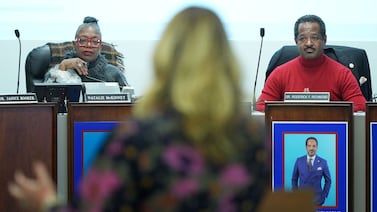The school board will vote next Tuesday on whether to close five schools at the end of this year. But parents say they’ve come to rely on Wells teachers and services.
Board members were divided in a vote Wednesday to promote the interim leader to a full-time gig. Some argued a full search would be needed for transparency, while others stressed the urgency for stability.
Interim Superintendent Roderick Richmond said Tuesday that no official findings or conclusions have been reached in the $6 million investigation, despite state lawmakers insisting on ‘concerning’ early results.
The district received a waiver from the Tennessee Department of Education after taking two full weeks off of class. That exceeded MSCS’ built-in snow days by two, prompting the need for state assistance.
The MSCS board is set to vote Wednesday on whether to initiate a full search process as interim leader Roderick Richmond’s contract expires. The decision comes as state lawmakers push to upend the district leadership system.
The judge ruled Monday that the county commission’s bid to put all nine school board seats up for election this year is invalid. That saves five MSCS board members from facing shortened terms.
The district says state auditors haven’t presented any evidence of fraud or abuse to constitute further investment. Republican lawmakers didn’t name specifics either.
The district used up all of its built-in snow days as of Wednesday. Thursday’s closure means MSCS students could lose scheduled break time or face an extended school year.
Tennessee Republicans have been pushing for an MSCS takeover since July. Community advocates say they’ve been working behind the scenes to protect local control.
The district is moving quickly through its allowance of inclement-weather days.











